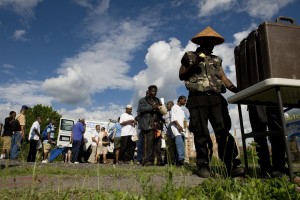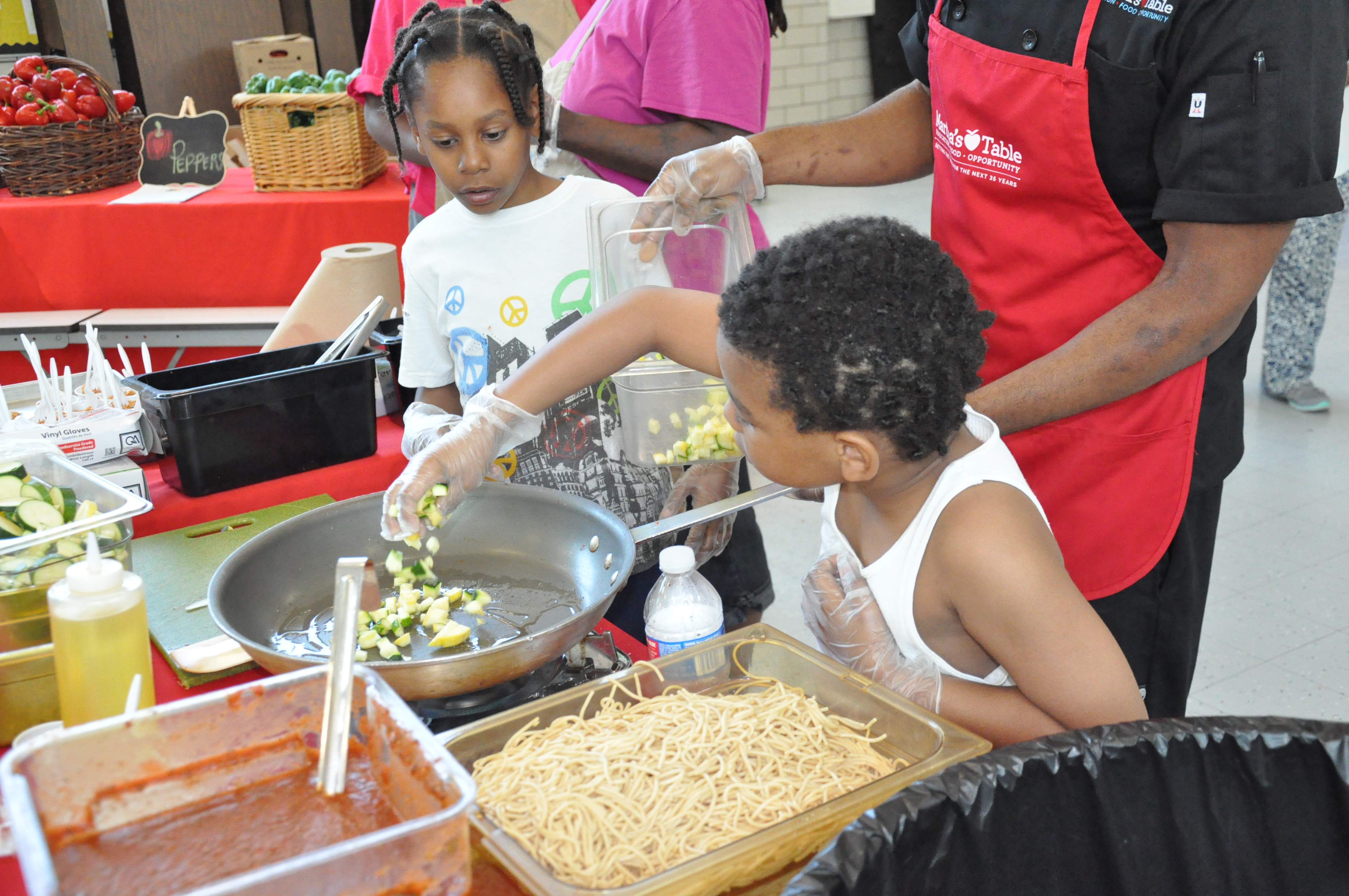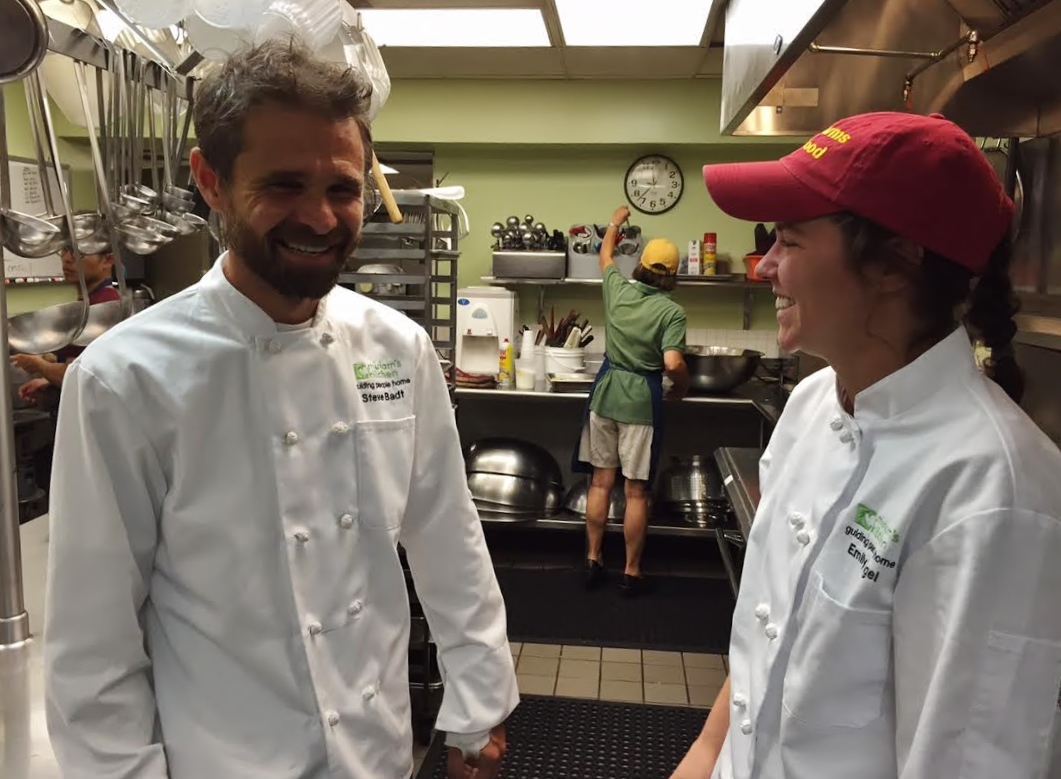WASHINGTON — At 5:30 p.m. on a Wednesday, a white van rounds the corner of Pennsylvania Avenue NW and pulls up to the curb alongside 19th Street, just blocks from the White House.
Three passengers jump out the back of the vehicle and quickly work to set up tables. An orange cooler of water is hoisted onto one; on the other, a tray of hot food and a bag of utensils.
People shuffle by wearing business suits and carrying briefcases, but amid the hustle and bustle of the city, a quiet crowd of 20 forms.
Bins containing hundreds of sorted sandwiches are pulled from the van, and within minutes, everything is ready.
“Would you like some beef and rice?” a passenger asks the group that’s gathered.
“For sandwiches, we have peanut butter and jelly and bologna and cheese tonight,” another says.
—
McKenna’s Wagon is a mobile food truck operated by Martha’s Table. Seven days a week, 365 days a year, the van heads out to three locations in the city to serve a hot meal, bagged sandwiches and homemade muffins to anyone who is hungry.
“People normally think that everyone who comes through the line is homeless, and as you can see, a lot of these individuals are coming home from work,” says Afiya Howell, deputy director of prepared foods at Martha’s Table.
“It’s happening every day. With people you would say hello to and good morning, you would never know that they’re skipping meals. … They have jobs, they have homes — they just can’t necessarily afford that additional meal.”

Hunger is especially an issue during the summer months for families who depend on free and reduced meals at school. One in three children in the District doesn’t know where his next meal will come from. With school out, that uncertainty is even greater.
Summer is also a tough time for organizations, such as Martha’s Table, who rely heavily on volunteers from student groups and school service societies. And this summer, Martha’s Table is hurting for sandwiches.
“Unfortunately in the summertime, we get a shortage of sandwiches because our primary source of sandwiches is schools,” Howell says.
And the organization goes through a lot of sandwiches. Every evening, McKenna’s Wagon, which has been running since 1983, takes 400 sandwiches out to the city’s streets.
The sandwiches are a nice addition to the hot meal, but more importantly, they’re portable and relatively shelf stable. And for someone who is uncertain of his next meal, sandwiches are security.
“Some people don’t even want the hot meal; they just come and get about 12 sandwiches to carry them through,” Howell says. “It’s so they can always have a meal — that’s the idea.”
Others take bags of sandwiches back to their children, spouses or friends who can’t make it out to the van. If there are enough sandwiches for everyone, the volunteers running the nightly operation try not to place a limit on the number each person can take.
“It’s a meal for them,” Howell says.
And it’s one that is guaranteed. “Right now, where we are, we’re just feeding people who are hungry.”
—
The volunteers driving McKenna’s Wagon serve the hot meals, distribute hundreds of sandwiches and catch up with the van’s regulars in less than 15 minutes. Once the last person is served, the tables, coolers, bins and trays are loaded back into the van, and the group heads out to the next stop near McPherson Square.
There, the whole operation begins again.
Howell says every night is different, but the van typically serves between 20 and 80 people at each stop. That doesn’t include the additional 20 to 40 people that come by Martha’s Table at 4 p.m. for the same meal, served in the back alley of the building. Most of the regulars who stop by live and work in the neighboring 14th Street community.
Similarly to McKenna’s Wagon, the majority of those who stop by for the backdoor dinner eat the hot meal on site and take a bag of sandwiches home for later.
Howell is hopeful that when school starts up, the sandwich shortage will come to an end. But until then, staff and volunteers at Martha’s Table are turning to the community for help.
Anyone can make and donate sandwiches to go out on McKenna’s Wagon. Howell says all you need is a loaf of bread, a jar of peanut butter and some jam. The organization also accepts sandwiches made with lean meats and cheeses.
Because the population served is more likely to have health issues, Howell encourages those who donate to use whole wheat bread. It’s also preferred that condiments be left off the sandwiches to prolong shelf life. You can find detailed guidelines for sandwich donations on the Martha’s Table website.
Howell says one sandwich can really make a difference for those who are food insecure.
“There’s nothing like seeing someone — you can look at them and tell they haven’t had food in a while … They are just hungry.”







